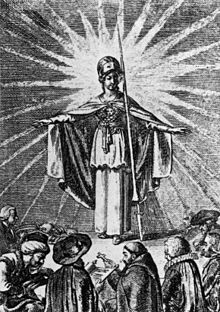مدارا: تفاوت میان نسخهها
محتوای حذفشده محتوای افزودهشده
Amidelalune (بحث | مشارکتها) بدون خلاصۀ ویرایش |
جز ربات :جایگزینی پیوند قرمز با مترادف فارسی Christian cross > صلیب مسیحی |
||
| خط ۱: | خط ۱: | ||
[[File:Für Toleranz.jpg|thumb|Sculpture ''Für Toleranz'' ("for tolerance") by [[Volkmar Kühn]], [[Gera]], Germany ]] |
[[File:Für Toleranz.jpg|thumb|Sculpture ''Für Toleranz'' ("for tolerance") by [[Volkmar Kühn]], [[Gera]], Germany ]] |
||
[[File:CrossMenorahOxford 20051225KaihsuTai.jpg|thumb|The [[ |
[[File:CrossMenorahOxford 20051225KaihsuTai.jpg|thumb|The [[صلیب مسیحی|cross]] of the [[war memorial]] and the [[Menorah (Temple)|Menorah]] for [[Jewish people]] coexist in [[Oxford]].]] |
||
[[File:Minerva als Symbol der Toleranz.jpg|thumb|Minerva as a symbol of enlightened wisdom protects the believers of all religions ([[Daniel Chodowiecki]], 1791)]] |
[[File:Minerva als Symbol der Toleranz.jpg|thumb|Minerva as a symbol of enlightened wisdom protects the believers of all religions ([[Daniel Chodowiecki]], 1791)]] |
||
نسخهٔ ۲۹ اوت ۲۰۱۲، ساعت ۲۰:۱۳



رواداری،[۱][۲] تسامح یا تلرانس یا مدارا، به «عمل عمدیای گفته میشود، برای پذیرش یا اجازه دادن به چیزی که شخصا قبول ندارد. کسی میتواند به شکل معنادار در مورد مدارا(پذیرفتن یا اجازه دادن) صحبت کند، که در موقعیتی باشد که بتواند نپذیرد یا اجازه ندهد.» این اصطلاح همچنین در معنای «تحمل و تاباوردن» یا «پشتیبانی، حمایت یا نگهداشتن» (اندیشهی متفاوت) هم تعریف شده است. [۳]
تساهل و تسامح از ارزشهای مهم لیبرالیسم سیاسی است و به خصوصیت اخلاقی گفته میشود که بیانگر طرز برخورد با تمایلات، اعتقادات، عقاید و رفتار با دیگران است.
بنابراین اصل، آزادیهای فردی تنها هنگامی از تعرض در امان میماند که جامعه باورها و عقاید مختلف مردم ساکن در آن را تاب بیاورد و هیچ عقیدهای سرکوب نشود.
منابع
- ↑ داریوش آشوری
- ↑ دهخدا
- ↑ Perez Zagorin, How the Idea of Religious Toleration Came to the West (Princeton: Princeton University Press 2003) ISBN 0-691-09270-2 , pp. 5–6, quoting D.D. Raphael et al.
- کتاب اصطلاحات سیاسی، به کوشش عبدالرحمان میاح
